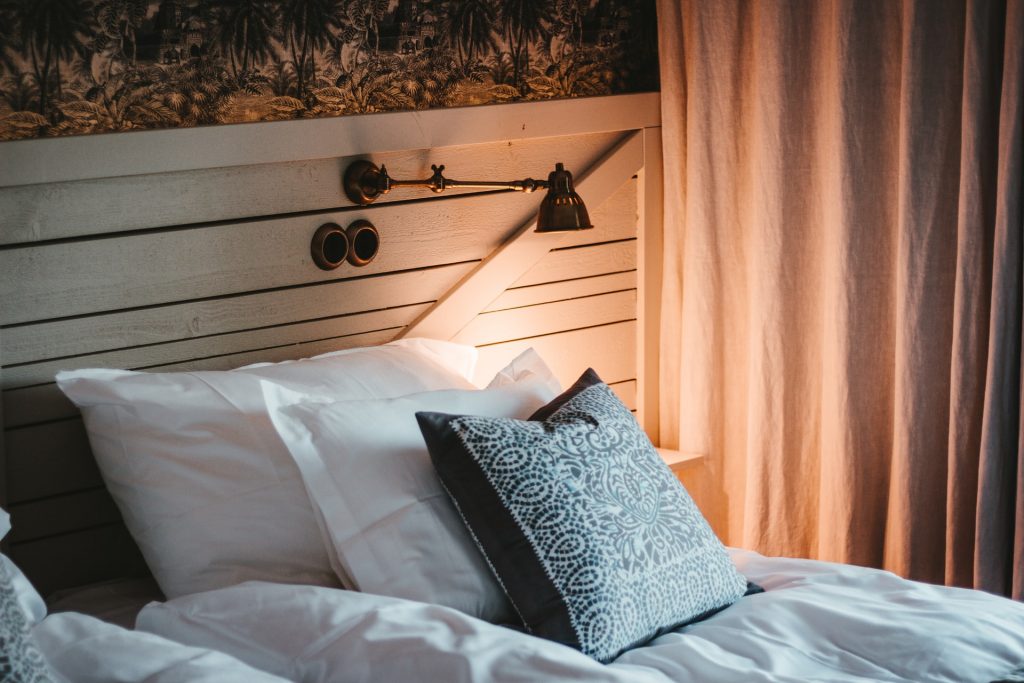Table of Contents
Source: unsplash.com/@julianhochgesang
If getting a good night’s sleep feels like an impossible task to achieve, you are not alone. Many people struggle with sleep deprivation, and its causes differ from one person to another. Some attribute it to their horrible sleeping patterns, while others blame it on stress.
Either way, that tossing and turning will only result in extreme exhaustion the following day. So, if you want to know how to overcome sleepless nights, then grab a blanket, curl up, and keep reading to find out!
1. Take a Relaxing Bath
The most common sleep treatment is taking a warm bath one or two hours before bedtime. While taking a cold shower has its own merits, a warm bath helps with better temperature regulation and muscle relaxation, both of which can lead to improved sleep.
While bathing with water alone is enough, try adding essential oils like lavender or chamomile to induce a little zing. This will not only make your skin smell nice, but it will also give your mind a chance to relax. However, if you are not one to take a bath once the sun goes down, simply soaking your feet in hot water using your favourite water heater will suffice.
2. Reduce Long Daytime Naps
A quick nap in the wee hours of the afternoon can be relaxing and remedial as they help you feel less grumpy or ensure you are properly rested if you work outside of regular working hours. However, prolonged naps can have adverse effects on the quality of your night’s sleep.
The desire to sleep during the daytime is an indication that you are not receiving adequate sleep at night, which is linked to an increased risk of acquiring certain chronic diseases. In some cases, napping creates a vicious cycle. People tend to sleep during the daytime to compensate for missing periods of sleep at night, which in turn forces your body to stay awake when night falls.
3. Optimize Bedroom Environment
If you find yourself feeling tired all day long, it is possible that your bedroom is to blame. Nothing in your home will have a more significant impact on your life than a serene and well-decorated sleeping atmosphere. Take a look around. If you spot some dust or pollen floating around your bedroom, consider investing in an air purifier.
Lack of sleeping from allergies could roll over into the next day, triggering sneezing, coughing, itchiness and congestion. Another thing to consider is decluttering things that are not meant to be in the bedroom, like work documents. There must always be a boundary set in place.

Source: unsplash.com/@adrien
4. Establish a Consistent Routine
Humans are habitual creatures. Bedtime habits, like any other, generate a pattern in our brain that helps our bodies identify when it is time to sleep. Your brain begins cooling down for a slumber a few hours before bedtime as part of your natural sleep-wake cycle.
You can enhance the efficacy of that process by incorporating certain activities such as yoga or reading. To begin, set your bedtime and wake-up hours and commit to them every day. Then set a timer for half an hour before bed to start your bedtime routine. These acts will naturally train your brain to feel sleepy when it is time to sleep.
5. Monitor Your Caffeine Intake
Many people drink caffeinated beverages such as coffee, tea, and sodas during the day to boost their energy levels. However, consuming excessive intake can cause detrimental effects on your sleeping schedule and, ultimately, your overall health. To avoid this, limit your caffeine consumption and avoid it, especially later in the day.
Here’s a billion-dollar question. How much is too much? If you drink more than three cups of caffeinated coffee each day, you may want to consider cutting back. Remember that 400 milligrams (mg) of caffeine alone is already equivalent to 10 cans of coke. To be safe, make it a cup per day or, even better, none.
6. Avoid Bright Screens Before Bed
What appears to be harmless behaviour can actually have a significant influence on your overall health. Know that after a long period of mental overdrive during the day, your mind needs the time to wind down before bed.
Doom scrolling, for instance, can keep you alert for hours as it keeps your mind engaged and stimulated. Unfortunately, your phone’s blue light is also bad for your eye health as the colour reflects daylight. Though it may be great during the day, it is not exactly what you need to do before hitting the hay. So, best to avoid it for at least an hour before shutting your eye.
Even if falling asleep is the last thing on your mind at night, beauty sleep is not entirely out of reach. So, rather than becoming upset or stressed out, try to incorporate those steps one at a time. Then, once you have figured out what works best for you, you can gradually build those habits up. And before you know it, you will finally be getting the rest you deserve!

